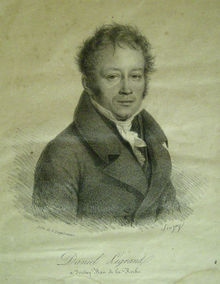Daniel Legrand
Daniel Legrand (* 1783 ; † 1859 ) was an industrialist and philanthropist of Swiss origin. He belonged to the Reformed Church . He is considered an important forerunner of international labor law.
Life
Daniel Legrand was born in 1783 as the son of the Swiss industrialist and politician Johann Lukas Legrand . At the invitation of Pastor Johann Friedrich Oberlin, he settled in the village of Fouday and founded a band factory there. His son Daniel took over the factory and also continued Oberlin's social and educational commitment. Daniel Legrand was particularly committed to protecting children who work in factories . He wanted to awaken people's sense of morality in the factories and factories , pointing out that the family life of the workers must be appreciated and respected. With great honesty he uncovered the grievances of his time and denounced them. In this way he indicated that the wages of the fathers could be reduced as soon as the children were able to earn some of their living themselves. Accordingly, child labor did not lead to an increase in the income of the poor sections of the population, but to an increase in work. Daniel Legrand made contact with influential political figures in France and abroad and helped ensure that a law was passed in France on March 22, 1841 , which laid the basis for the regulation of child labor. However, the law fell far short of Daniel Legrand's expectations regarding the duration and conditions of child labor. But he was able to win over industrialists from the Vallée de la Bruche for his ideas, and so children under the age of 12 were not allowed to work in their factories. The children also received schooling up to the age of 16 . The 1841 law provided for such instruction only up to the age of 12. Daniel Legrand also founded a school for small children in Ban de la Roche (German: Steintal) . He was also the author of a bill entitled Draft International Law on Manufacturing Labor Within the Six Weekly Working Days . This law should ensure the protection of all working minors . However, Daniel Legrand's demands were not realized during his lifetime, but only in 1919 with the establishment of the International Labor Organization . Daniel Legrand was buried next to his wife Adèle Scherrer in the Fouday cemetery not far from the grave of Johann Friedrich Oberlin. On September 2, 1928, a plaque in honor of Daniel Legrand was inaugurated in the same place .
literature
- Loïc Chalmel: Jean-Luc and Daniel Legrand, des relais essentiels. In: Oberlin. Le pasteur des Lumières. La Nuée Bleue, Strasbourg 2006.
- H. Monnier: Daniel Legrand et la législation internationale du travail. Société générale d'impression, Paris.
- Albert Thomas: Inauguration d'une plaque commémorative en l'honneur de Daniel Le Grand à Fouday, le 2 septembre 1928. Société de l'histoire du protestantisme français, Paris 1928.
- Raymond Weiss: Daniel Le Grand, 1783-1859: son œuvre sociale & internationale. With a foreword by Albert Thomas. Paris 1926.
| personal data | |
|---|---|
| SURNAME | Legrand, Daniel |
| BRIEF DESCRIPTION | Industrialist and Philanthropist |
| DATE OF BIRTH | 1783 |
| DATE OF DEATH | 1859 |
